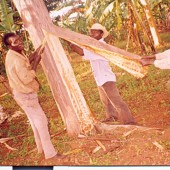Since a curriculum represents a selection of socially constructed knowledge, it should be interpreted as a stake-holder in an ideological process. It is a political issue whose forms depend, among other things, on the degree to which education systems are centralized. Today, supranational bodies can influence the curriculum, particularly within the framework of UNESCO’s implementation of the decade of Education for Sustainable Development (ESD). Consequently, examining the curricula associated with the emergence of ESD involves examining the politics underlying them, politics which are not always explicitly stated – hence the interest in the concept of a hidden curriculum. The purpose of this study is to analyze the ESD curriculum in France. To this end, we use a methodology that considers the main work conducted about ESD in the framework of French research programs and based on the concept of hidden curriculum. This requires performing a diachronic analysis of changes in curriculum choices and forms of schooling, and identifying the value system underlying those changes. We identify several of the main characteristics of those changes, including in terms of project dynamics, partnership, transdisciplinarity, the role of knowledge, the distance from practice, and the persistence of a western conception of development. We then situate the French specificities within the international context.
Continue Reading
Decent life depends on nature’s provision of stable resources. In this report I explore cultural efforts embedded within nature preservation and environmental education among the indigenous Baganda and how these can be emulated to inform modern environment conservation programmes. Accordingly, environmental conservation in Buganda was guided by clearly streamlined gender roles and cultural values through spirituality and the clan system which defined the ethical relationships between human culture and the environment. The key challenges towards this include gender inequality and the associated stereotypes, the political climate in the country, and modern religions. Successful mitigations should essentially hinge on integrating indigenous conservation methods in formal school curriculum as well as undertaking sensitization and empowerment campaigns geared towards nature preservation.
Continue Reading